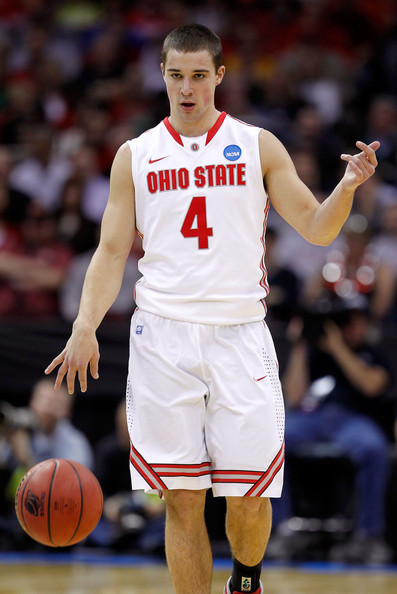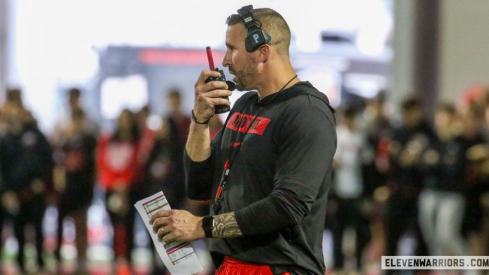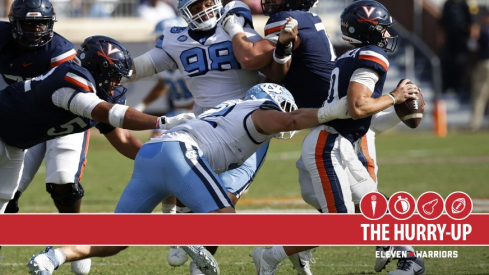Aaron Craft is a gamer. Just a gutsy, hard-nosed player with an eye for the ball. A four year starter (who seems like he's been around forever), Craft is a scrappy natural leader who garners respect from both teammates and coaches. The heart and guts that he plays with is evident, and I know I wouldn't mind one of my little cousins dating a fine young man like that. He's also deceptively athletic, despite being one of the smartest players that you'll ever see take the court.
Yep, Aaron Craft is one heck of an adjective noun adjective, and I'll always remember the time that [anecdote about Rubix cubes or pre-med or whatever].
Sorry, I got lost in Aaron Craft's dreamy eyes for a second, but I meant every word of that. I also believe that Amir Williams has "untapped potential," that Braxton Miller is a "tough, slippery guy" and that Urban Meyer is an "aggressive coach and recruiter." Bradley Roby is fast, Ryan Shazier is hard nosed, Sam Thompson is an elite athlete, Johnny Manziel is a douche, Nick Saban is a control freak, Mike Leach is literally insane, and none of the aforementioned players and coaches have any personality traits beyond what I've just described. I know this because TV and the internet and radio told me so.
Which brings me to my topic. A few days ago, in the leadup to the NBA All-Star game, LeBron James was asked who should be on the "Mount Rushmore" of NBA players. He gave a very safe, predictable answer to an incredibly boring question that's been asked a million times, so naturally that has provoked a week-long reaction of people debating whether or not LeBron short changed anyone. Bill Russell even got involved for some reason, but given that snubs are the electricity that have recharged Russell's anger-powered internal battery for like 80 years, maybe that's not a huge shock.
Anyway, the real annoyance here is that in lieu of even giving players one character detail which they obsessively harp on, sports writers have spent the past week or so patting themselves on the back for figuring out a new way to ask "Who's the best ever?" as if that were a novel or interesting question to talk about.
It isn't, and as an addendum to this really lazy week of sportswriting I've decided to make my Mount Rushmore of sports cliches as applied to players. Ohio State fans like you and I are subjected to a ton of them, and it's important to recognize them before they grab you with their claws.
1. Guts
Guts is probably the most baffling cliche that I can think of, and a pretty good example of why these overused descriptors are destroying the English language.
I have no idea what "guts" is supposed to mean. For instance, I'm terrified of heights. Hate 'em. So in my estimation, a skydiver or a ski jumper or an Olympic diver has way, way more guts than a person who tackles other dudes for a living.
But really, what makes "guts" or "tough" or whathaveyou so stupid and awful is that they're usually used in the context of an injury. Someone who plays through obvious pain is gutsy. Someone who plays with an injury is scrappy. Which is all well and good, except someone who plays with a concussion could wind up dead. But we don't like to think about the long term ramifications of playing with severe injuries, because images like Byron Leftwich being carried to the line of scrimmage by his teammates is a much more pleasing memory. Apparently.
2. Brains
I am willing to admit that there are some legitimately dumb athletes, at least in terms of their sport (there are many, many dumb athletes in terms of say, the ACT, but that's beside the point).

But "brains" and "intelligence" are used all the time as modifiers for athletes that oftentimes don't deserve it, and aren't given to players that do. Aaron Craft, to use one lightning rod example, is often called one of the smartest players in the Big Ten, and not because of his GPA or whatever, but because of his defensive prowess. Great.
Except that he continues to struggle with turning the ball over, something that has caused Ohio State trouble at key times in game sin the past. Contrast that with a guy like Braxton Miller, who in three years has only had one multi-interception game, yet rarely gets credit for his decision making skills.
3. Athleticism
Ah, but Braxton sure is athletic, isn't he? Sam Thompson sure can jump out of an arena, can't he?
There's definitely a weird racial component to the adjectives that we assign players, but it's weird and complicated and not just based on any one thing. My argument is this: players of any sport at a high level are all incredible athletes in one way or another. Peyton Manning with his shirt off looks like some goober gas station attendant in a 1970s movie about a swamp monster, but he's still athletically gifted and everyone will acknowledge that.
Contrast that with a guy like Pitt Brown, who we constantly ragged on this past season for poor play, yet is still about five times the athlete in terms of strength and conditioning that your average internet denizen is in real life.
They're all athletes. The problem is that we give that title to players we're too lazy to find out anything more about.
4. "Terrific young man"
This is the Abraham Lincoln on the Mount Rushmore of Horrible Sports Cliches That Need to Die.
How many times will a play by play man or color commentator extol the virtues of a given player, usually using some combination of the above words, and then finish it off with "...and he's a terrific young man, respectful, and well-spoken." What tangible benefit do you get from knowing that your favorite athlete isn't a huge asshole? Because yeah, while many perceived knuckleheads are exactly that, a lot of the players that we think of shining examples of virtue are anything but.
The truth is, we want to believe that the people we root for in sports are good people because that justifies our investment in what they do. If we're rooting for a jerk who we know is a jerk, then guess what? We're now jerks by proxy, one of the worst things by proxy that you can be.
I'm not against this in theory. If someone is deadbeat dad or a drug addict or abusive, I want to know so I'm not defending a bad person. But in sports, particularly college sports, there's really no way of knowing who's putting on a nice face for the cameras and who is genuinely a decent dude or dudette. So we continue to insist that sportscasters and writers assure us that our trust isn't misplaced, and anxiously wait for the police blotter to remind us that sometimes it is.
What I'm calling for here is nuance.
People, especially athletes in the public eye, don't deserve to be put into singular boxes that offer up easy definitions about their overall being. And if you can't come up with something more than that, than maybe that's not the right approach to be taking when talking about them.
A few days ago, Bode Miller won a bronze medal in the Super-G event at the Sochi Olympics. NBC, in the post race interview, prodded him with questions about his recently deceased brother until he eventually broke down and cried while being recorded. For NBC, that was the climax of a narrative they had built about Miller over the preceding days, which included putting a microphone on his wife and talking about his age ad nauseam.
Here was the old dog of American skiing, far removed from his glory days, giving it one last shot for his new wife, his kids, and most of all for his brother who recently died tragically. American flags, hot dogs, fireworks, kids on rope swings jumping into a lake while John Cougar Mellencamp blasts in the background.
It was all very invasive and saccharine and made for television, and of course conveniently left off the part where Miller is in an ugly custody battle involving his ex-wife who is being penalized for moving to New York City to attend law school while she was pregnant.
I don't know if any of that makes Bode Miler a hero or a jerk or a redemption story or what, but what I do know is that he made a spectacular recovery on the second turn of his Super-G race to preserve his chance at a medal. His skis hit a soft patch of snow, but Miller was able to correctly shift his weight to both avoid wiping out and preserve his path down the mountain. The mechanics and analysis of that instance of legitimate athletic brilliance, not what exact words of encouragement that Bode Miller's new wife shouted during that moment, are what I think is interesting about sports.
Let's see more of that.


